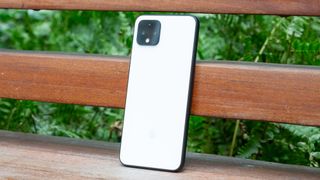Forget the Google Pixel 5: The Pixel 6's secret weapon just leaked
Google Pixel 6 will use a custom-built CPU made by Samsung - which is bad news for Apple

The Google Pixel 6 might be Google's first smartphone to launch with custom hardware, bringing its smartphones in line with Apple's iPhones.
A report by Axios (via Android Central) claims that Google has entered a partnership with Samsung to design a custom chipset, codenamed "Whitechapel." Axios' source claims that the first prototypes of these chips have been delivered to Google in the past few weeks, but the final product will appear on Pixel phones by 2021. The new processors are also expected to arrive on the Pixelbook series of laptops at some point after that.
- Google Pixel 5 release date, specs, price and rumors
- Check out our OnePlus 8 Pro review
- Just In: iPhone 12 Pro Max design revealed in new video
Google already uses some custom hardware in its phones, namely the Pixel Visual Core that debuted on the Google Pixel 2 for photo processing and the Neural Core that first appeared on the Google Pixel 4 to enhance machine learning.
Samsung has experience making CPUs already, thanks to its Exynos line of chips that appear in its Galaxy S20 and Galaxy Note 10 handsets (plus many of their predecessors) sold outside of the US. Samsung is also responsible, along with TSMC, for building some of the A-series processors for Apple's mobile devices, most recently the A9 used in the iPhone 6S.
Axios claims that the Whitechapel chip will be built on a 5nm process. This will be the same size as the successor to Qualcomm's 7nm Snapdragon 865 CPU, so in theory it'll pack a similar amount of power into a similarly sized piece of silicon. The custom Google chip will have 8 ARM cores (the same number and same architecture as the 865), but will be optimized for "always-on" usage, to benefit the features enabled by Google Assistant.
So why is this troubling news for Apple and the iPhone? Apple is currently the only smartphone maker that has control over both its software and its hardware designs. The only Android phones that don't use a CPU designed by Qualcomm or MediaTek are Samsung and Huawei, which makes its own Kirin line of chips through HiSilicon. But both Samsung and Huawei still use Android, not having yet tried to launch a proprietary rival to Google's open source operating system.
If Google is able to successfully make its own CPU, it could allow for the same seamless integration of hardware and software that Apple currently enjoys with its A-series CPUs and iOS/iPad OS software. However, it could be a long year for Google until the Pixel 6's release, particularly since the iPhone 12 is rumored to have some revolutionary changes like the addition of 5G, 120Hz displays and a wider variety of handset sizes.
Sign up to get the BEST of Tom’s Guide direct to your inbox.
Upgrade your life with a daily dose of the biggest tech news, lifestyle hacks and our curated analysis. Be the first to know about cutting-edge gadgets and the hottest deals.
We also haven't heard much about this year's rumored Google Pixel 5 yet. We're expecting it to run on Android 10, and to inherit the 90Hz display from the Pixel 4. It'll hopefully get 5G compatibility and an ultrawide camera to join the main and telephoto sensors already present on the Pixel 4. However, some rumors suggest it'll use a Snapdragon 765 CPU instead of an 865, pointing towards a possible focus on affordable pricing over raw power that could undercut the likes of Samsung, Apple and even the new OnePlus 8 Pro.

Richard is based in London, covering news, reviews and how-tos for phones, tablets, gaming, and whatever else people need advice on. Following on from his MA in Magazine Journalism at the University of Sheffield, he's also written for WIRED U.K., The Register and Creative Bloq. When not at work, he's likely thinking about how to brew the perfect cup of specialty coffee.
-
Vintagehotdog Oh no! Samsung is who I have been getting away from by buying LG and Pixel phones because I find there software sucks. Hope Google writes all the software.Reply
Most Popular

